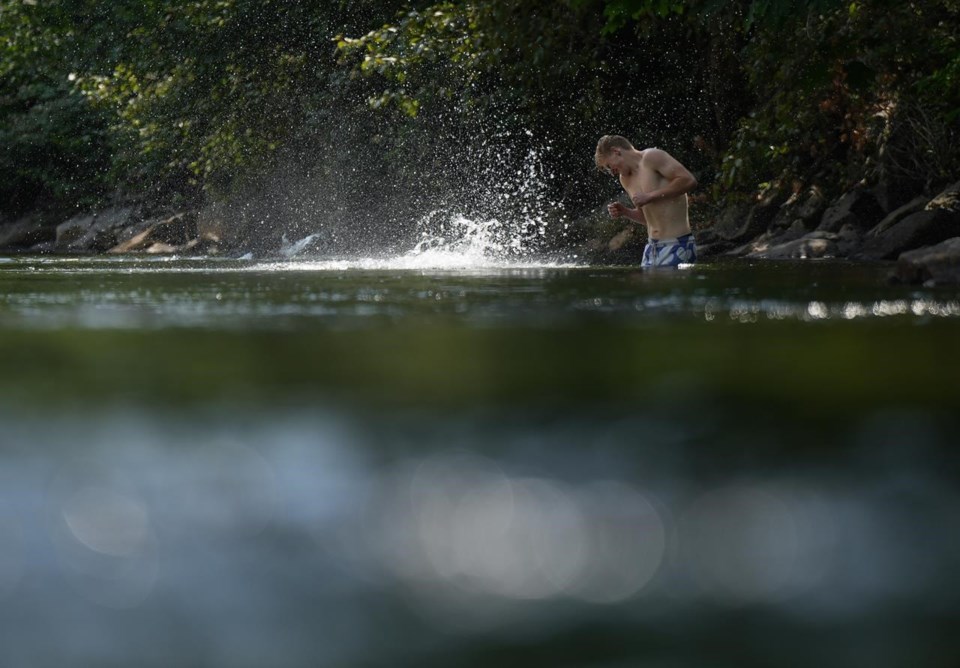A protracted heat wave expected to last most of the coming week got underway in British Columbia on Sunday as provincial officials warned residents to brace for the potential effects of the sustained stretch of sweltering temperatures.
Heat warnings from Environment Canada blanketed much the southern coast of B.C. on Sunday, with more expected to take effect in the Interior and beyond on Monday.
Temperatures are forecast to soar into the high 30s in some regions, prompting Emergency Management Minister Bowinn Ma to urge residents to try and avoid the heat, drink water and limit outdoor activity.
The ministry issued a statement on Saturday saying this week's expected heat wave is not slated to be as severe as the 2021 heat dome in which a reported 619 people died, but residents should be prepared for the potential health impacts of prolonged heat exposure.
"Those most at risk are older adults, especially if they live alone, and people with health conditions, such as mental illness, substance-use disorder, physical disabilities, cognitive impairment, respiratory disease, heart disease, kidney disease and diabetes," the ministry release said. "People who are pregnant, infants and young children are also at increased risk."
Forests Minister Bruce Ralston has said the above-average temperatures will quickly dry out watersheds and people should continue to conserve water.
More than 80 per cent of the province has reached Level 4 or 5 drought conditions, the highest possible rankings.
Seventeen of B.C.'s 34 water basins are at Level 4 drought conditions, meaning harm to ecosystems and communities is likely. Another 11 are at Level 5, meaning all efforts should be made to conserve water and protect critical environmental flows.
Environment Canada is predicting temperatures as high as 38 C by Wednesday in Kamloops, while in Port Alberni temperatures are expected to remain in the low-to-mid 30s all week.
The agency issued heat warnings Saturday along the south coast. It forecasts Vancouver, the Fraser Valley and Howe Sound will see temperatures reaching about 33 C between Sunday and Wednesday, with overnight lows near 17 C. Temperatures are expected to cool by a few degrees on Thursday.
Meanwhile, East Vancouver Island and Sunshine Coast are expected to see daytime temperatures reaching between 29 and 32 C until Wednesday, with overnight lows near 16 C.
Environment Canada issued another warning Sunday for the South Thompson and southern Fraser Canyon regions, saying the heat wave will begin in those areas Sunday. It expects daytime temperatures of up to 38 C and overnight lows of 18 C.
"Well above seasonal daytime temperatures combined with elevated overnight temperatures will mean little relief from the heat," the statements said.
Separate heat warnings were issued for Kootenay Lake, where temperatures are forecast to top 37 C between Monday and Thursday, andNorth Thompson, where highs of 29 C are expected.
"A strong ridge of high pressure will bring rising temperatures to the southern interior," it said, noting the heat wave will begin in those regions starting Monday.
Special weather statements were also issued in the South Okanagan, including Penticton, and the northern Cariboo regions between Monday and Thursday. Seasonal temperatures are expected to return Friday, the weather agency said.
The statements said cooler nighttime temperatures over those regions will provide some relief from the heat, but Environment Canada said a heat warning will be issued if nighttime temperatures reach 18 C or above in the South Okanagan and if they climb above 14 C in the northern Cariboo.
Fire officials have warned that August is typically the hottest and driest month, saying that such conditions could exacerbate wildfire conditions amidone of B.C.'s worst fire seasons on record.
Since April, the BC Wildfire Service has reported almost 1,800 wildfires have scorched about 16,000 square kilometres across the province.
There are about 380 active fires burning across B.C., about 180 of which are classified as out of control while 11 are considered "fires of note," meaning they remain threatening or highly visible.
This report by The Canadian Press was first published Aug. 13, 2023
Brieanna Charlebois, The Canadian Press



